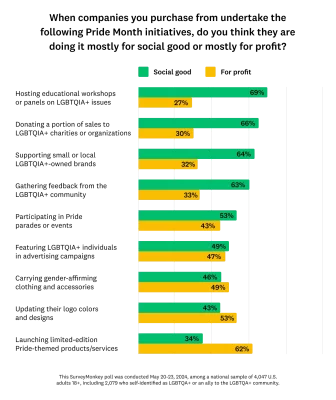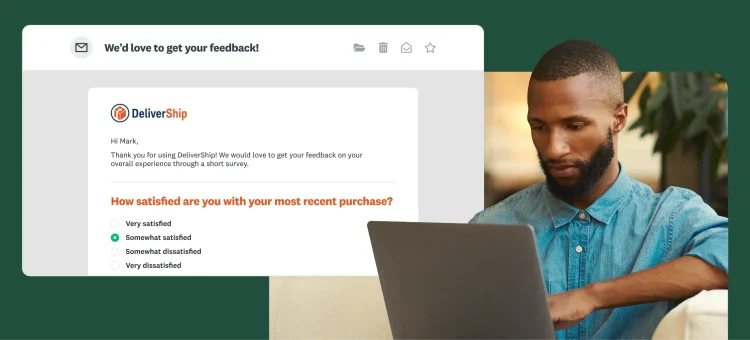Pride Month has become a time for companies to showcase their commitment to LGBTQIA+ (Lesbian, Gay, Bisexual, Transgender, Queer, Asexual, Intersex, and other sexual orientations and gender identities) inclusion.
Yet, amid the vibrant displays of rainbow-themed products and branding, many in the LGBTQIA+ and ally communities question whether organizations' efforts are genuinely supportive or primarily profit-driven.
To understand how companies can do better, we asked over 4,000 U.S. adults, including 2,079 who self-identified as LGBTQA+ or an ally to the community, ultimately finding:
- The LGBTQIA+ community and its allies expect companies to demonstrate a consistent, year-round commitment to LGBTQIA+ inclusivity.
- Performative or superficial gestures, often called "rainbow washing," are met with skepticism and can damage trust.
- Internally-focused educational initiatives and ongoing support for LGBTQIA+ rights are viewed as more authentic and meaningful Pride activities.
Keep reading for more key findings from our survey and four tips for respectfully celebrating Pride Month and LGBTQIA+ inclusivity all year round.
Pride month statistics 2024
The LGBTQIA+ community and its allies have differing views on corporate support for LGBTQIA+ rights and Pride Month
The LGBTQIA+ community and their allies are divided on corporate involvement in supporting LGBTQIA+ rights and Pride Month celebrations. While 58% believe companies should advocate for LGBTQIA+ rights, 37% feel corporations do not belong in Pride Month celebrations.
Should companies even put in the effort? According to our data, nearly half (49%) of LGBTQIA+ and allied adults think that a company should still do something for Pride, even if it's half-hearted, while 48% prefer no effort over a disingenuous one. Regardless, 71% expect companies to be transparent about their Pride initiatives.
The majority of LGBTQIA+ individuals and allies view corporate participation in Pride as performative or “rainbow-washing”
Most of the LGBTQIA+ community and allies perceive corporate participation in Pride as surface-level support rather than a genuine commitment to LGBTQIA+ rights and inclusivity.
Specifically:
- 64% believe companies' efforts are mostly performative gestures rather than a meaningful commitment to diversity, equity, and inclusion
- 29% believe that "rainbow-washing" or “pinkwashing” is the worst mistake a company can make in celebrating Pride
- 34% don't think companies are listening to LGBTQIA+ perspectives when planning for Pride
Hosting educational panels or workshops on LGBTQIA+ issues is seen as the most authentic Pride Month initiative
Hosting educational panels or workshops on LGBTQIA+ topics is seen as the most genuine Pride Month initiative, with 69% saying companies are doing it “for social good” and 27% saying it’s “for profit.”
These responses indicate a widespread recognition of the value of education and awareness in fostering genuine support for the LGBTQIA+ community.

Pride marketing campaigns: Informative, cringeworthy, or empowering?
According to our research, LGBTQIA+ and allied adults express varying sentiments toward Pride-themed promotional activities. While just 11% consider insensitive marketing campaigns the worst mistake during Pride celebrations, 42% of respondents have encountered Pride Month campaigns they deemed "performative," and 29% have encountered “cringeworthy” campaigns.
However, while some Pride Month campaigns miss the mark, others effectively inform and empower individuals within the LGBTQIA+ and ally communities: 30% have seen campaigns they found “informative,” and 29% say they’ve witnessed “empowering” ones.
Interestingly, LGBTQIA+ and allied adults who are likely to purchase Pride merchandise are more likely to find Pride marketing campaigns “empowering” (43% vs 29%) or “informative” (41% vs. 30%).
Despite these mixed opinions regarding promotional initiatives, when asked if companies should reduce their 2024 Pride Month activities to avoid backlash and social media criticism, 72% say they should not.
Support for the LGBTQIA+ community influences the spending habits of the LGBTQIA+ community and their allies
Nearly half (42%) of the LGBTQIA+ community and allies think it’s important for the companies they purchase from to participate in Pride. However, 41% are more inclined to buy from companies that support the LGBTQIA+ community year-round.
Thirty percent of LGBTQIA+ and allied adults say they research a company’s LGBTQIA+ policies before purchasing—a figure that rises to 49% among those likely to buy Pride-themed products this year.
Moreover, 32% of LGBTQIA+ individuals say they have boycotted or stopped supporting a company due to its lack of acknowledgment or celebration in Pride, more than twice as many as all survey respondents (14%).

The biggest Pride Month blunder a company can make is overlooking its problems internally
According to 40% of the LGBTQIA+ community and their allies, the gravest error a company can commit during Pride Month is overlooking internal issues such as discrimination, harassment, or the absence of inclusive policies within their organization.
Additionally, 29% highlight "rainbow-washing," exploiting perceived support for LGBTQIA+ rights for financial gain, as the biggest mistake an organization can make during Pride.

Most employers aren’t doing enough to support LGBTQIA+ employees all year round
While 40% of LGBTQIA+ and allied workers report that their workplace offers Pride Month activities, 30% believe their workplace doesn't do enough throughout the year to support LGBTQIA+ employees. That number jumps to 40% among just LGBTQIA+ workers.
Additionally, LGBTQIA+ employees note limited support for transgender and nonbinary individuals at their workplaces. Just 24% of LGBTQIA+ employees report that their workplace supports transgender and nonbinary individuals by hosting regular diversity and inclusion training sessions or using inclusive language.
Moreover:
- 19% say their workplace has inclusive bathroom policies
- 17% say their workplace has employee resource groups or affinity groups for transgender and nonbinary individuals
- 15% have gender-affirming benefits
- 15% have family planning benefits
- 13% have comprehensive transition support programs
Related: Learn how to ask survey questions on sexual orientation and gender identity.
4 tips for respectfully celebrating Pride Month and LGBTQIA+ inclusivity all year round
#1: Measure DEI at your organization
You can’t fix what you don’t measure. This couldn’t be more true when it comes to changing your workplace culture and meeting DEI goals. Start by conducting comprehensive assessments of diversity, equity, and inclusion within your organization.
Leverage pulse surveys, employee engagement surveys, and DEI metrics to gather data on LGBTQIA+ employees' identities and experiences and uncover areas for improvement.
Analyze survey results to understand the diversity landscape across various aspects of the employee lifecycle, including recruitment, retention, promotion, and employee satisfaction.
Related: See how the Golden State Warriors leveraged SurveyMonkey to expand its DEI initiatives.
#2: Host diversity & inclusion education sessions
Build a culture of understanding and inclusivity by organizing regular diversity and inclusion training sessions for employees at all levels.
Work with LGBTQIA+ employees, DEI experts, and LGBTQIA+ advocacy groups to develop tailored learning programs to address unique challenges and opportunities related to LGBTQIA+ inclusivity.
Use surveys, polls, and quizzes throughout your educational sessions to test knowledge and make virtual sessions more engaging. Get started in minutes with our training evaluation survey template.
#3: Uncover how your marketing campaigns land with a range of audiences
The most powerful way to understand which concepts and messaging resonate with your target audience is to ask them directly.
Refine messaging strategies by identifying what resonates with your target audiences. Measure effectiveness through automated analysis of slogans, taglines, and positioning. Analyze metrics like brand sentiment, message recall, association, and emotional response.
Evaluate the performance of ad creative and pinpoint the most effective elements for high-performing campaigns. For instance, before launching new ads for a Pride-themed product line, seek direct feedback from the LGBTQIA+ community through surveys or focus groups.
#4: Foster a feedback-centric workplace culture
Feedback should be at the center of every organization’s DNA. Employee feedback offers essential insights that drive continuous improvement and innovation, enhancing the overall employee experience.
Establish channels for employees to share their thoughts, suggestions, and concerns, including:
- Anonymous surveys: By allowing anonymity, employees may feel more comfortable expressing their opinions honestly and without fear of reprisal.
- Suggestion boxes: Place physical or digital suggestion boxes where employees can submit their feedback anonymously.
- Employee Resource Groups (ERGs): Create ERGs dedicated to specific communities or interests, such as LGBTQIA+ employees.
Gathering feedback is important, but it's not enough on its own. It's crucial to take action based on the insights you get. This involves making meaningful changes and effectively communicating what actions have been taken (read more on best practices for closing the feedback loop).
By building a feedback-centric workplace culture, organizations can create an environment where every employee feels valued, respected, and empowered to contribute to the company's success (which positively impacts the customer experience, too).
In conclusion
Our research reveals that while the LGBTQIA+ community and its allies appreciate the visibility and support that Pride Month brings, they also expect companies to demonstrate a genuine, year-round commitment to LGBTQIA+ inclusivity. Public-facing, performative acts and “rainbow washing” are met with criticism, while internally-focused educational initiatives and support for LGBTQIA+ rights are seen as more authentic.
Engaging authentically with LGBTQIA+ communities and understanding the effectiveness of your efforts can build trust, loyalty, and a positive brand perception. As society continues to evolve, it is essential to listen to and amplify LGBTQIA+ voices, ensuring that your actions reflect a commitment to equality and inclusion during Pride Month—and beyond.
This SurveyMonkey poll was conducted May 20-23, 2024, among a national sample of 4,047 U.S. adults 18+, including 2,079 who self-identified as LGBTQA+ (identified as transgender, nonbinary, asexual, bisexual, gay, lesbian, pansexual, or queer) or an ally to the LGBTQA+ community. Respondents for this survey were selected from the more than 2 million people who take surveys on our platform each day. The modeled error estimate for this survey is plus or minus 2 percentage points. Data were weighted for age, race, sex, education, and geography using the Census Bureau’s American Community Survey to reflect the demographic composition of the United States.



